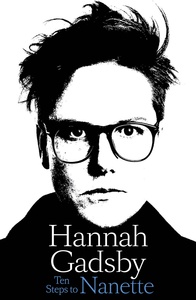You need to sign in or sign up before continuing.
Take a photo of a barcode or cover
emotional
funny
reflective
medium-paced
If you thought watching Nanette on Netflix was painful, in this book Gadsby goes into what it was like for her to write it, structure it and perform it, over and over, with varying degrees of hurt depending on her mental state and the audience response. Performing the show so many times seems to have blunted the sharp edges of the pain for her, and it's not quite as raw as in the show, but the hurt is still very much there.
She also tells us about her childhood, her relationship with her family and her peers, and her relationship to her sexuality, including the political landscape of Tasmania and the internalised homophobia she grew up with. As far as retelling her physical and sexual assault, except for the sexual abuse she went through as a child, she doesn't go into much more detail than she does in the show, in case that's holding you back from reading this book.
Gadsby's mother is a central figure in this book, and she seems like the kind of person who is rude a lot without necessarily meaning to be hurtful, but it comes across as kind of mean nonetheless. That said, Gadsby appears to have a good relationship with her.
After watching the show, I wanted to know more about her background in art history, and there's more about that in this book. Her art documentary, called "Nakedy Nudes", is also available on YouTube and Amazon Prime, so that's on my watch list next. That was also an exhausting experience for her to film, since none of the men she interviewed seemed to be particularly self-aware, or understand the point of the questions she was asking them.
We also learn about her interactions with the audience during and after the performances and how she created a few sensory safety measures to accommodate her autism in extremely clever ways.
I can strongly recommend the audiobook version of this book, which is read by Gadsby herself and includes snippets from the Netflix special for additional context.
She also tells us about her childhood, her relationship with her family and her peers, and her relationship to her sexuality, including the political landscape of Tasmania and the internalised homophobia she grew up with. As far as retelling her physical and sexual assault, except for the sexual abuse she went through as a child, she doesn't go into much more detail than she does in the show, in case that's holding you back from reading this book.
Gadsby's mother is a central figure in this book, and she seems like the kind of person who is rude a lot without necessarily meaning to be hurtful, but it comes across as kind of mean nonetheless. That said, Gadsby appears to have a good relationship with her.
After watching the show, I wanted to know more about her background in art history, and there's more about that in this book. Her art documentary, called "Nakedy Nudes", is also available on YouTube and Amazon Prime, so that's on my watch list next. That was also an exhausting experience for her to film, since none of the men she interviewed seemed to be particularly self-aware, or understand the point of the questions she was asking them.
We also learn about her interactions with the audience during and after the performances and how she created a few sensory safety measures to accommodate her autism in extremely clever ways.
I can strongly recommend the audiobook version of this book, which is read by Gadsby herself and includes snippets from the Netflix special for additional context.
funny
inspiring
sad
medium-paced
DNF at 58%. I loved Nanette (and Douglas) and was so so sooo excited for this book, but ultimately I just could not get into it and felt like I was forcing myself every time I picked it up.
The second hand embarrassment was too much for my poor little heart
Was very hard to get into reading the physical book- switched to the audio and remembered how much I enjoy Hannah’s delivery of words. Definitely a book to be listened to, not read. Their voice makes understanding the truth of their trauma an experience. All the trigger warnings for this book.
A lot of history of Australia’s LGBTQ legislation in the 80/90s that was really interest interspersed with childhood anecdotes— felt like a solid continuation/deepening of Nanette
emotional
inspiring
reflective
medium-paced
Graphic: Homophobia, Rape, Violence
dark
emotional
funny
hopeful
informative
inspiring
reflective
medium-paced
challenging
dark
reflective
sad
slow-paced





